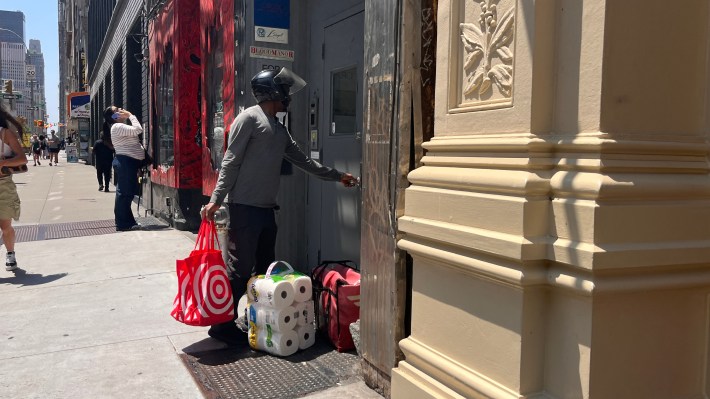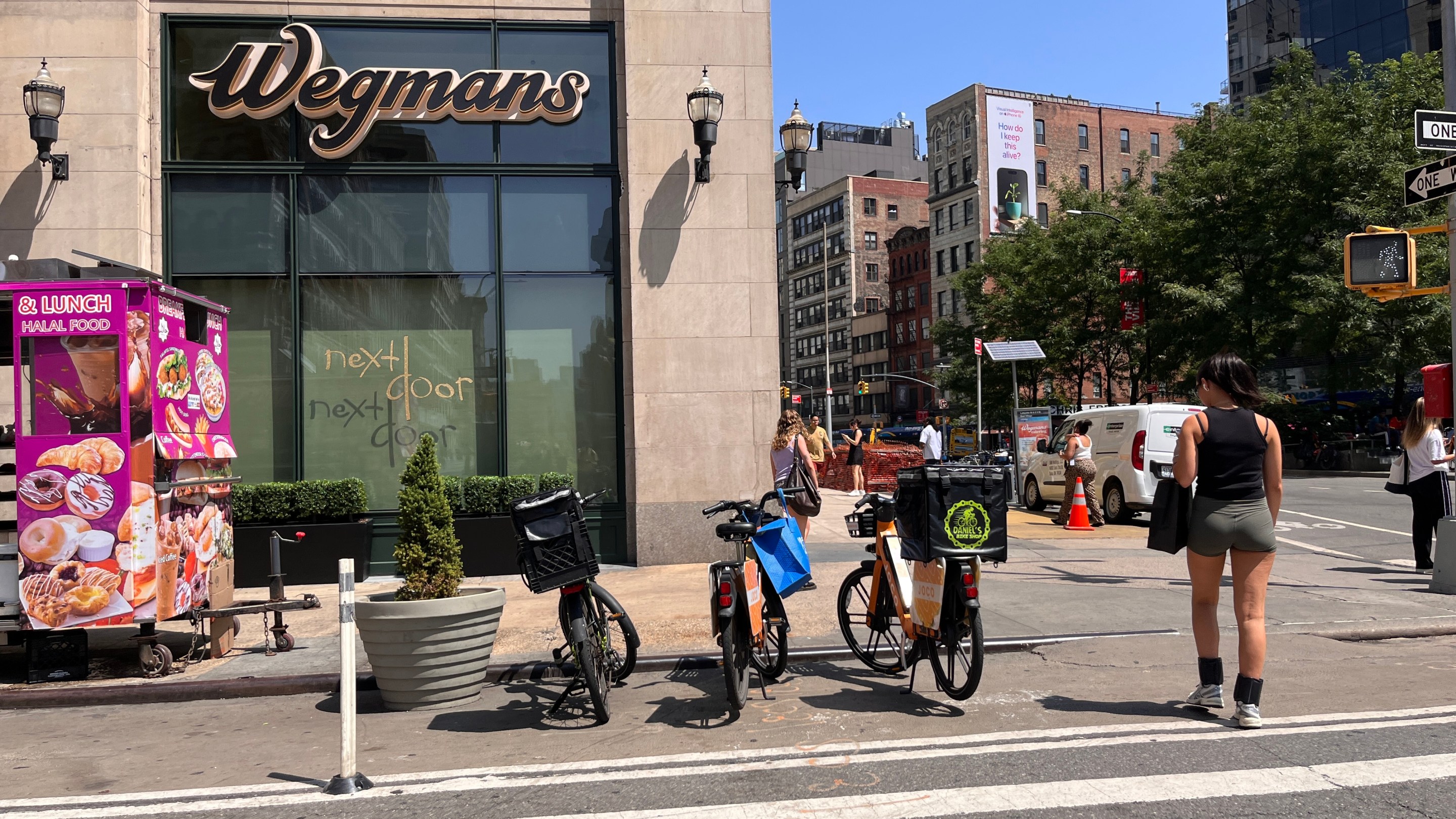As early as Tuesday night, Mayor Adams is expected to veto a bill that would force Instacart and other grocery delivery companies to pay their workers a minimum wage even as new information comes to light revealing that the $13-billion tech company has been bragging about boosting profits by "squeezing" workers.
Streetsblog has learned from multiple sources that Adams plans to veto Intro 1135, which would close the "Instacart loophole" by requiring grocery delivery companies to pay workers the same minimum wage that restaurant delivery apps already do.
The move comes days after the company publicly announced its "squeeze" on workers: In a quarterly earnings call last week, executives for the publicly traded company told shareholders that business was indeed booming. The key? Reducing the amount the company spends on pay to workers — which it calls "shoppers" — by "batching" orders.
"We've had gains broadly in shopper pay," the company's chief financial officer Emily Reuter said in the meeting. "Shopper pay broadly is an area that we've driven pretty meaningful leverage over the course of the last few years as we've really squeezed out efficiencies."
Translation: Instacart has made more money by increasing worker productivity, which it did not pass onto those workers.
Instacart has also created unspecified "efficiencies" that kept their workers making their deliveries very quickly.
"So we mentioned that 25 percent of our priority orders are now batched, and were still able to complete those in a way that gets those orders to our customers on the same timeframe, which in many cases is under 30 minutes, which is pretty incredible to see," Reuter said.
Batching orders and paying shoppers in this way is fundamental to Instacart expanding its business. Recently the company reduced the minimum shopping basket size to $10 for members, down from $35, increasing its order volume. But the company could only do this because of "gains" by squeezing workers.
"We are ultimately focused on trying to drive affordability for the end consumer. And so if we can drive gains in shopper pay and, you know, give that back to the consumer in the form of cheaper delivery or better targeted incentives those are the kinds of areas that we're looking to double down," Reuter said.
Instacart's lies
Since the pay parity bill was introduced last December, Instacart has been spending money to try to block the bill from becoming law.
At first, the Chamber of Progress, which is funded by Instacart and other tech companies, started arguing that the bill would raise costs for Instacart's low income consumers and harm New Yorkers who are food insecure.
The group's argument ignored the fact that the bill does not require Instacart to raise any of its costs, just that it pay its workers a minimum pay rate. And it failed to reckon with the reality that grocery delivery is inherently more expensive than going to the store.
Since the bill passed a month ago, Instacart and its allies have increased their attacks. Instacart started the group "New Yorkers For Affordable Groceries" that poses as an activist organization but in reality is funded by the company. Such groups are often derided as Astro-Turf organizations, as opposed to "grassroots" ones.
The group's slogan is "more affordable groceries," which is misleading since the bill will only affect grocery delivery companies and, again, does not require those companies to increase prices.
But delivery worker advocates are pushing back against the notion that Instacart cannot afford to keep its fees the same, and pay its workers fairly.
"Instacart spent $1.5 billion in 2024 buying back its own stock — more than enough to pay workers fairly," Los Deliveristas Unidos said in a statement. "The company’s claim that it cannot afford living wages is a business decision, not a necessity. The real solution lies in reducing exorbitant app commissions, improving transparency and efficiency, and offering subsidies for low-income families—not sacrificing workers’ livelihoods. Mayor Adams should stand with workers and reject corporate excuses."
When the first minimum pay rate was passed for restaurant app workers in 2021, the companies pushed back in a similar fashion. They argued that costs would go up and even sued the city over the law (which Instacart has vowed to do if Intro 1135 passes). But a Department of Consumer and Worker Protection report showed that the minimum pay rate did not raise prices to consumers in any meaningful way.
"Consumers’ average total cost, inclusive of subtotal, tips, fees, and taxes, only increased by $0.76 — or 2 percent — from $38.35 in Q1 2023 to $39.11 in Q1 2024," a City Hall press release read.
It's the mayor's own idea!
The City Council passed Intro 1135, along with a package of other industry focused bills, to bring Instacart to pay parity with the other restaurant delivery app companies which are already paying their workers minimum wage since the deliverista minimum wage law passed in 2021.
Grocery delivery has expanded drastically since then, and there are now an estimated 20,000 Instacart and other grocery delivery workers making their living providing this service. As Streetsblog revealed last year, these thousands of workers have been doing the same job as deliveristas, but getting paid far less for their work.
And the mayor himself, who is planning to veto the bill, has been aware of this problem since at least 2022 the "Blueprint for Economic Recovery" report which estimated that 17,000 workers were not being covered by the minimum wage, and this was before Instacart expanded its fleet to include e-bikes and mopeds, so that number is now likely much higher.
But despite past promises Hizzoner is siding with big business and is expected to veto the bill, which passed with a "veto proof" majority of 36 council votes. This means that in the event of a veto, the Council can override the Mayor's it with a minimum of 34 votes. The Council Speaker, Adrienne Adams, voted in favor of the bills.
“Mayor Adams’s claims of supporting a sustainable delivery sector are completely hollow if he fails to support its workers by vetoing this bill. This Council will always stand up for working-class New Yorkers in our city, not use them for a cheap political slogan,” Council spokesperson, Julia Agos, told Streetsblog.
Worker experience
On the steps of the Public Theatre on Lafayette Street in Manhattan, a dozen young men, many asylum seekers from Guinea or other West African countries, wait for someone, somewhere in the five boroughs, to order something from Wegmans on Instacart. The orders come in, their phones ding, and they’ll open the app.
One worker, Aboubacar Barry, 29, told Streetsblog that he's worked with Instacart for over a year. He said that Instacart jobs come in as orders but can have multiple clients, consistent with the executive's description of "batching."
“Sometimes it's acceptable. Sometimes it's not acceptable, but we do it anyway. Sometimes it's hard, but you have to live somehow,” he said in French. “You have to get by.”
Barry started his day at Wegmans at 8 a.m. on Tuesday. By mid-afternoon, he’d made two runs up to Midtown, one with three different clients. He was paid $8.25 by Instacart and made $25.35 in tips.

Which workers get heard?
Instacart's arguments, through its funded groups, highlight workers who use the job as extra income, but for thousands like Barry, this is their full time job. Ads from New Yorkers For Affordable Groceries don't feature anyone like him and his fellow African immigrants who make up a large portion of the workforce.
And these men are intimately familiar with the pattern of greed that dominates the industry. Some workers at Astor Place were waiting for Wegmans orders through DoorDash, which already has to comply with minimum pay, and have noticed the opaque scheduling practices and lockouts that have been a consequence of the companies trying to continue to maximize profits while complying with the law.
When Barry considered the proposal for an hourly wage, he thought it made sense for him because he knows the setup of Wegmans, and he has access to a car and a bike. But he said he worried that the company would find a way to penalize the delivery worker (as they already do, say, when a client complains that their groceries weren’t delivered and Instacart refunds them, nullifying the tip).
“Imagine there are other [workers] who can spend more than two hours buying an order and then delivering it, more than three hours if necessary. And how will Instacart pay them?” he asked.
A friend interrupts: "Well, if that worker is paid hourly, then it’s good, isn’t it?"
“No! What I am saying is that they will not do that,” Barry answered. “They will estimate that you can complete this order in an hour, even if it takes you more than two hours. For them, it's clear that you spent an hour on it, so that's what they will pay you.”
Ultimately, what would be best is if Instacart paid more per order, he said.






